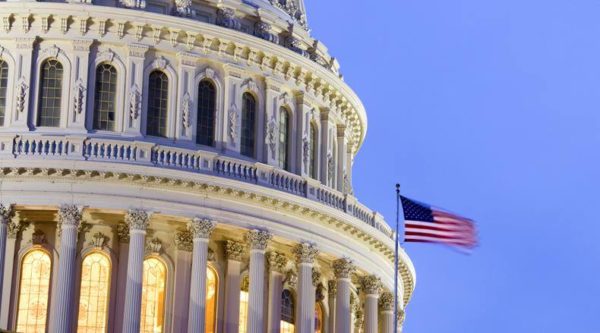
- Details
- By Levi Rickert
The legislation—heralded by President Donald Trump and his Republican allies as a "big, beautiful bill," and condemned by House Minority Leader Hakeem Jeffries (D-NY) and Democrats as a "big ugly bill"—passed through Congress on Thursday afternoon, largely along party lines. Only two Republicans, Rep. Thomas Massie (R-KY) and Rep. Brian Fitzpatrick (R-PA), voted against it. The final vote was 218–214.
Formally a continuing resolution, the bill was designed to fund the government after Congress failed to pass a budget by the October 1, 2024 deadline. The delay gave President Trump the opportunity to include an extension of the tax cuts for billionaires from his first term, along with several key items from his broader agenda.
Trump is expected to sign the legislation—designated H.R. 1—on the Fourth of July. The bill represents the most significant legislative achievement for Republicans in the current session of Congress. It includes sweeping changes to major social safety net programs such as Medicaid, Medicare, and SNAP.
Facing broad public opposition—polls show Americans oppose the bill by a margin of 2-to-1—many of its more controversial provisions have been delayed from taking effect until after the 2026 midterm elections. Nonetheless, the bill will become law once it is signed by the president on Friday.
Because the legislation passed just before the Fourth of July holiday weekend, a detailed analysis of how last-minute changes could impact Indian Country will not be available until after the three-day break. However, what is currently known is that American Indians and Alaska Natives have been exempted from certain major cuts to Medicaid and SNAP.
According to economists, a recent bill is projected to increase the federal deficit by $3.3 trillion over the next decade. This increase is primarily attributed to the bill's extension of the 2017 tax cuts.
Below is a summary of key provisions affecting Tribes, compiled by the National Indian Health Board (NIHB):
Key Provisions to Know:
Medicaid Work Requirements:
-
American Indians and Alaska Natives are exempt from community engagement and work requirements.
-
The bill prohibits states from using 1115 waivers to bypass these work requirements.
SNAP Work Requirements:
-
American Indians and Alaska Natives are also exempt from SNAP work requirements.
Medicaid Cost-Sharing:
-
Existing cost-sharing protections for American Indians and Alaska Natives are preserved. No new cost-sharing measures will be introduced.
Medicaid Redetermination:
-
While the bill shortens Medicaid redetermination from 12 months to 6 months for most groups, American Indians and Alaska Natives will retain the 12-month redetermination period.
Rural Healthcare Transformation Payments:
-
The bill provides up to $50 billion over five years to support rural healthcare providers. Tribal programs may participate if they meet general eligibility requirements.
Medicaid PBM Spread Pricing:
-
A House provision banning spread pricing by pharmacy benefit managers (PBMs) in Medicaid was removed by the Senate. NIHB will continue advocating for this ban in future legislation.
Although most changes will not be implemented until 2026 or later, the NIHB has pledged to work with Tribes to ensure they are directly involved in the policy and regulatory processes, in order to protect federal trust and treaty obligations.
More Stories Like This
Native News Weekly (August 25, 2024): D.C. BriefsUS Presidents in Their Own Words Concerning American Indians
Indigenous Actor Elaine Miles Reports Detention by Alleged ICE Agents
Happy Thanksgiving from Native News Online
Coming Up on Native Bidaské: Behind the Animation: Joey Clift Talks “Pow” and Native Storytelling
Help us tell the stories that could save Native languages and food traditions
At a critical moment for Indian Country, Native News Online is embarking on our most ambitious reporting project yet: "Cultivating Culture," a three-year investigation into two forces shaping Native community survival—food sovereignty and language revitalization.
The devastating impact of COVID-19 accelerated the loss of Native elders and with them, irreplaceable cultural knowledge. Yet across tribal communities, innovative leaders are fighting back, reclaiming traditional food systems and breathing new life into Native languages. These aren't just cultural preservation efforts—they're powerful pathways to community health, healing, and resilience.
Our dedicated reporting team will spend three years documenting these stories through on-the-ground reporting in 18 tribal communities, producing over 200 in-depth stories, 18 podcast episodes, and multimedia content that amplifies Indigenous voices. We'll show policymakers, funders, and allies how cultural restoration directly impacts physical and mental wellness while celebrating successful models of sovereignty and self-determination.
This isn't corporate media parachuting into Indian Country for a quick story. This is sustained, relationship-based journalism by Native reporters who understand these communities. It's "Warrior Journalism"—fearless reporting that serves the 5.5 million readers who depend on us for news that mainstream media often ignores.
We need your help right now. While we've secured partial funding, we're still $450,000 short of our three-year budget. Our immediate goal is $25,000 this month to keep this critical work moving forward—funding reporter salaries, travel to remote communities, photography, and the deep reporting these stories deserve.
Every dollar directly supports Indigenous journalists telling Indigenous stories. Whether it's $5 or $50, your contribution ensures these vital narratives of resilience, innovation, and hope don't disappear into silence.
 The stakes couldn't be higher. Native languages are being lost at an alarming rate. Food insecurity plagues many tribal communities. But solutions are emerging, and these stories need to be told.
The stakes couldn't be higher. Native languages are being lost at an alarming rate. Food insecurity plagues many tribal communities. But solutions are emerging, and these stories need to be told.
Support independent Native journalism. Fund the stories that matter.
Levi Rickert (Potawatomi), Editor & Publisher

